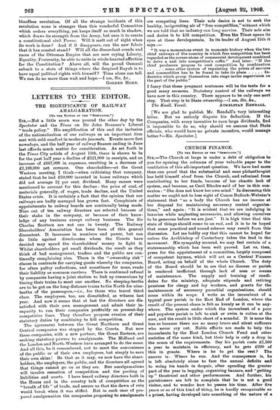LETTERS TO TIIE EDITOR.
THE SIGNIFICANCE OF RAILWAY AMALGAMATION.
[To ills Rums or TER "EPILVTATOR."] Sin,—Not a little scorn was poured the other day by the Spectator and the Times on Sir John Brunner's Liberal " trade policy." His amplification of this and the inclusion of the nationalisation of our railways as an important item met with cold comfort in moderate journals. Events move fast nowadays, and the half year of railway finance ending in June last affords much matter for consideration. As set forth in the Times City article of August 15th, there is shown to be for the past half year a decline of £521,000 in receipts, and an increase of £667,000 in expenses, resulting in a decrease of £1,188,000 net revenue. One shareholder7-at the Great Western meeting, I think—when criticising that company, stated that he had 250,000 invested in home railways which did not average 24 per cent. dividend. Many causes were mentioned to account for this decline : the price of coal, of materials generally, of wages, trade decline, and the United States crisis. It is certainly a fact that the opinion that our railways are badly managed has grown fast. Complaints of appointments to railway boards are continually being made. Nine out of ten railway directors are selected because of their stake in the company, or because of their know- ledge of any business except railway business. The Sir Charles &often; are not one in twenty. The Railway Shareholders' Association has been born of this general discontent. It increases in numbers and power, but can do little against directorates whom the Courts have decided may spend the shareholders' money to fight it. Whilst shareholders get small dividends, the result as they think of bad management, traders and the public are con- tinually complaining also. There is the " ownership risk " clause in contracts for carrying goods whereby the companies, for often paltry reductions, and sometimes for none, evade their liability as common carriers. There is continued refusal by companies having a joint station to link up connexions by timing their trains to meet one another. No sleeping-berths are to be got on the long-distance trains to the North for nine- tenths of the passengers,—i.e., for those who travel third class. The employees, too, are dissatisfied, as witness last year. And now it seems that at last the directors are dis- satisfied with their own management and admit their in- capacity to run their companies profitably on present-day competitive lines. They therefore propose evasion of their statutory. duties by combining to kill competition.
The agreement between the Great Northern and Great Central companies was stopped by the Courts. But now these companies, with a new partner, the Great Eastern, are seeking statutory powers to amalgamate. The Midland and the London and North-Western have arranged to do the same. And all this, be it remembered, not to meet the convenience of the public or of their own employees, but simply to save their own skins ! Be that as it may, we now have the share- holders, the employees, the public, and the directors all agreed that things cannot go on as they are. But amalgamations will involve cessation of competition and the pooling of liabilities and assets. I have heard railway directors both in the House and in the country talk of competition as the "breath of life" of trade, and assure us that the dawn of ruin would break when it was stifled. But in each ease of pro- posed amalgamation the companies proposing to amalgamate are competing lines. Their sole desire is not to seek the healthy, invigorating ate of free competition," 'without which we are told that no industry can long survive. Their sole aim and desire Is to kill tobipetition teen the Times opens its eyes at these developments. In its leader of August 15th it says :— It was a momentum; event hi economic history when the two chief railways of the country in which free competition has been regarded as the corner-stone of commercial development combined to drive a nail into competition's coffin." And later : "If the chief producers propose to oust competition by combination some other system of regulating the prices of services
and commodities has to be found to take its prate In- dustries which group themselves into rings invite supervision on the part of the public."
I fancy that these pregnant sentences will be the tents for a good many sermons. Statutory control of the railways we have now in this country. There appears to be only one next step. That step is to State ownership.—I am, Sir, Ire., [We are glad to publish Mr. Ileiidalrs very interesting letter. tut we entirely dispute his deduction. If the Companies, with every incentive to earn large dividends, find it impossible to do so, why should we assume that State officials, who would have no private incentive, would manage better F—ED. Spectator.]


































 Previous page
Previous page